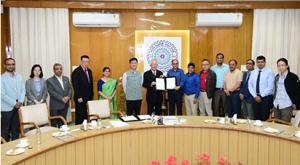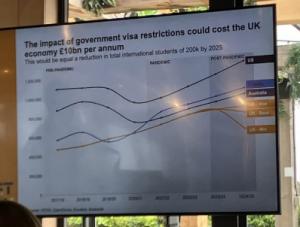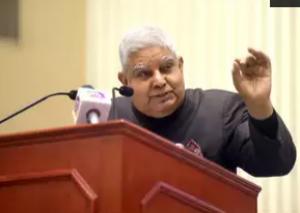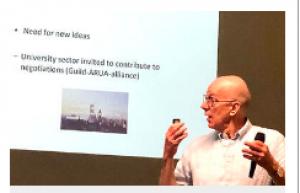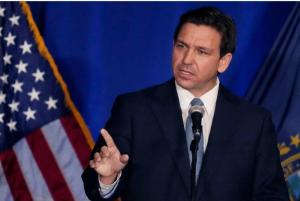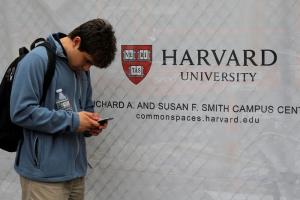Women and older international students will feel the brunt of a British government clampdown on foreign students bringing dependants when they come to the United Kingdom to study on one-year taught masters degree courses, say higher education experts.
Students from India and Nigeria will be disproportionately affected.
UK Home Secretary Suella Braverman finally ended months of intense speculation about how the British government would react to soaring numbers of international students, and their dependants, attracted to study at UK universities since the government introduced a new Graduate Route, allowing foreign students to live and work in the UK for two or three years after finishing their courses.
The increased number of foreign students and family members helped to push net migration figures up to 606,000 for the year ending December 2022, together with rising numbers of refugees and asylum seekers fleeing the war in Ukraine and a Chinese clampdown on Hong Kong citizens.
On 23 May Braverman issued a statement to parliament spelling out a package of measures including:
• Removing the right for international students to bring dependants unless they are on postgraduate courses currently designated as research programmes.
• Removing the ability for international students to switch out of the student route into work routes before their studies have been completed.
• Reviewing the maintenance requirements for students and dependants.
• Steps to clamp down on unscrupulous education agents who may be supporting inappropriate applications to sell immigration not education.
• Better communicating immigration rules to the higher education sector and to international students.
• Improved and more targeted enforcement activity.
The most controversial measure will affect those coming with family members and other dependants to study on one-year taught masters programmes in the UK, which disproportionately affects female and older students.
From January 2024, they will have to come alone and leave their families behind, as international undergraduate students already have to do.
The expected crackdown comes after net migration hit 606,000 in figures released by the Office for National Statistics on 25 May 2023 and blew a hole wide open in the post-Brexit message about taking back control of immigration following the Conservative government withdrawal agreement with the European Union.
Dr Diana Beech, chief executive of London Higher, the voice of universities in the UK capital, told University World News: “The only people set to benefit from the decision to prohibit international masters students from travelling to the UK with their dependants are those in competing major global economies, who will now be rubbing their hands at the prospect of welcoming the talented and ambitious individuals that the UK has effectively turned away.
“Evidence shows this decision will also disproportionately affect students from countries such as India and Nigeria, both priority countries in the International Education Strategy, as well as female students, who are more likely to bring dependants with them. For many universities in London, this will mean a significant reduction in annual intake.”
Her fear was echoed by Jamie Arrowsmith, director of Universities UK International, who said the government announcement provides some clarity after months of rumour, but it leaves some questions unanswered.
He welcomed the re-commitment to the ambitions set out in the International Education Strategy and confirmation that the Graduate Route will remain open and competitive.
While accepting that “the rise in the number of dependant visas has been substantial and has likely exceeded planning assumptions in government”, he warned that some of the measures would have a greater impact on women and students from certain countries.
British taught masters degrees can be completed in half the time it takes to do equivalent postgraduate courses in mainland Europe and many other countries and have proved very attractive to older students from countries now being targeted by UK universities as part of the government’s International Education Strategy.
The strategy encouraged British universities to look beyond China for foreign students to reduce over-dependence on Chinese students to prop up falling relative income from UK students due to a freeze on home tuition fees, and named India and Nigeria as two priority countries for student recruitment.
The result was very successful and boosted overall international student numbers in the UK from 485,000 in 2018-19 to over 680,000 last year, way ahead of the 600,000 target set for 2030, and increased the value of education exports to over £35 billion (US$43 billion).
The surge in Nigerian and Indian students coming to Britain to study saw a 50% increase in Indian students last year, rising to 126,535, and a 107% increase in students from Nigeria, whose number reached 44,195 in 2021-22.
Most came for a one-year taught masters degree and because they tend to be older with many bringing dependants with them on their student visas, this has led to housing shortages as UK universities don’t have enough family accommodation available.
The UK Home Office recorded in its statistics published on 23 February 2023 that 485,758 sponsored study visas were granted in 2022, 81% more than in 2019.
It also said that 135,788 of all sponsored study-related visas granted were to dependants of students, compared to 16,047 in 2019. The largest percentage of these were to dependants of Indian and Nigerian students.
Ray of hope
One ray of hope for those hoping to boost international student recruitment to the UK was Braverman saying in her statement: “We are committed to attracting the brightest and the best to the UK. Therefore, our intention is to work with universities over the course of the next year to design an alternative approach that ensures that the best and the brightest students can bring dependants to our world-leading universities, while continuing to reduce net migration.
“We will bring in this system as soon as possible, after thorough consultation with the sector and key stakeholders.”
Ruth Arnold, director of external affairs at Study Group, told University World News that she welcomed that the government “has confirmed its intention to work with universities over the course of the next year to consider ways of adapting the system to ensure the best and the brightest students can bring dependants to our world-leading universities, while continuing to reduce net migration”.
Dr David Pilsbury, chief development officer with the Oxford International Education Group, however wondered whether universities could get around the ban by extending their masters courses to last two years.
He told University World News: “Growth in demand for the one-year masters has been rocketing at such a rate I don’t think it will create particular issues for those universities that really know their markets and have infrastructure in-country to pre-qualify candidates.
“However, those who have just ridden the rising tide without investing in means and measures to engage with changing markets will undoubtedly be put under more pressure.”
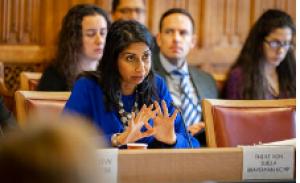
Source link: https://www.universityworldnews.com/post.php?story=20230524154709338
















